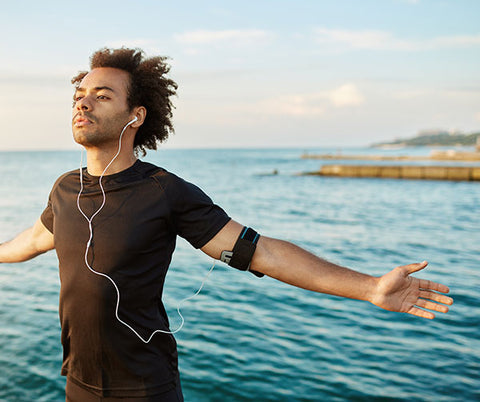You will be amazed to discover in this article all the main benefits of training as soon as you wake up and that you will be able to perceive throughout the day, simply with a few minutes of neuromuscular activation performed in the morning.
Why train as soon as you wake up?
1. Improves memory
During physical activity, training in the morning improves working memory due to the increase in the blood of the brain-derived neurotrophic growth factor BDNF .
2. It steers you towards healthier foods
A 2018 study recruited 2,680 college students to undertake a program where they had to exercise right after waking up for 15 weeks, with 3 sessions per week of 30 minutes of cardiovascular training in the morning.
The students were not asked to change their eating patterns, however they made healthier food choices .
3. Exercising in the morning improves mood and alertness
A morning workout can raise levels of hormones like cortisol, adrenaline, and endorphins that can improve your mood and increase your alertness . This will allow you to be immediately ready to start your day with maximum focus and joy.
4. Appetite Control
In general, exercise helps regulate appetite by reducing the hunger hormone ghrelin .
Physical activity in the morning also appears to increase the production of satiety hormones such as peptide YY and glucagon-like peptide-1.
5. Exercising right after waking up improves your night's sleep
Working out in the morning just minutes after waking up could be just what you need to improve your sleep at night .
The same 2014 study, published in Vascular Health and Risk Management , found that adults slept better on days they exercised in the morning, spending more time in deep sleep, and experienced fewer nighttime awakenings and also took less time to fall asleep.

Benefits of morning exercise
Exercise is essential to maintaining good health throughout life, and working out first thing in the morning is even healthier.
Not only do regular bouts of exercise confer a myriad of metabolic benefits across a range of tissues, but even a single bout of acute exercise can begin to activate molecular pathways and adaptations important to health .
So our advice is to dedicate, depending on the time you have available, a few minutes (from 5 to 30 min .) to neuromuscular activation in the morning in order to positively activate all the organs through molecular signals, hormones and cytokines, and exploit this advantage all day long .

Working out in the morning regulates internal clocks
The disruption of regular circadian rhythms (internal biological clocks), due to shift work or a modern lifestyle that is not compatible with physiological needs, is emerging as a new deleterious factor for the development of many diseases, chronic fatigue and loss of physical and cognitive performance.
Exercise is considered a powerful metabolic modulator capable of resetting internal biological clocks , slowing down the aging process, prolonging life and improving its quality.

Physiological adaptations in response to exercise stress in selected metabolic tissues

Exercise-mediated regulation of mitochondrial biogenesis and mitophagy at the molecular level
Is morning training the best time for everyone?
Many metabolic and hormonal variables related to physical activity have been shown to have rhythms (called circadian rhythms ) throughout the 24-hour period.
Three main categories of chronotype have been defined in people:
- morning types (M),
- evening types (E)
- neither (N)
Chronotype is the expression of an individual's circadian rhythmicity, understood as the type of psycho-physiological response that occurs during the day.
Do you struggle to work out in the morning?
If you struggle to exercise in the morning, you may be part of chronotype E.
Those who fall into this category are people who train well in the evening, feeling less tired than during a morning workout .
If, on the contrary, you feel less tired when exercising first thing in the morning, you probably have an M chronotype, meaning you are a morning person.
Physical activity is influenced by one's chronotype
An interesting systematic review published in the journal Sports Med. 2017, established that perceived exertion in relation to athletic performance is mainly influenced by chronotype: M types (Morning types) perceived less exertion during physical training with a submaximal load in the morning compared to N types (neither morning type nor evening type, 65% of the population ) and E (Evening types).
What is the best performing chronotype?
People who fit an M chronotype (morning types) have generally shown better athletic performance in the morning, as measured by race times, than N and E types.
Many studies on circadian cycles suggest the importance of raising the level of cortisol ( stress hormone ) during the first 30 minutes of waking up and then lowering it as much as possible.
Morning physical activity is an excellent method to acutely raise this very important hormone . In this way it is easier to remain physiologically aligned with the ideal psycho-neuro-endocrine balance during the rest of the day.
So, even if you find it hard to schedule any real physical activity right in the morning, you could at least develop a small exercise routine to unleash all the benefits listed above and start your day off right.
Can we change our chronotype to improve performance?
Although chronotype is partially determined by a person's genetics, it may be modified over time through training sessions scheduled at different times than usual.
This allows both to satisfy the subject's available time and to maximize performance in a task set at an "unusual" time (Stephenson & Roden, 2015; Facer-Childs & Brandstaetter, 2015).
It is important not to take away hours of sleep to train in the morning
Taking away hours of sleep to work out in the morning is not ideal, getting enough sleep (7-9) is as important as doing regular physical activity .
So if you can go to bed earlier, so you can wake up in time to do some physical activity without giving up sleep then that will be perfect, otherwise wake up just 10-15 minutes earlier and just do a muscle awakening (5 minutes of stretching, 5-10 minutes of training).
It won't be a real workout, but it will be enough to create a spike in blood cortisol levels, which will lead to significant physiological benefits.
Workout right after waking up: try our routine
You will only need 10 minutes to do it , it is 3 exercises to be done one after the other for 3 times (sets) with 2 minutes of rest between each set . You will not need any special equipment just your willpower, and you will also discover that training in the morning will become a practice that you will love to do every day


Sources:
- Br J Sports Med. 2020 Jul;54(13):776-781. doi:10.1136/bjsports-2018-100168
- Sports Med. 2017 Sep;47(9):1859-1868.doi: 10.1007/s40279-017-0741-z
- Review Int J Mol Sci. 2020 Apr 28;21(9):3106.doi: 10.3390/ijms21093106



